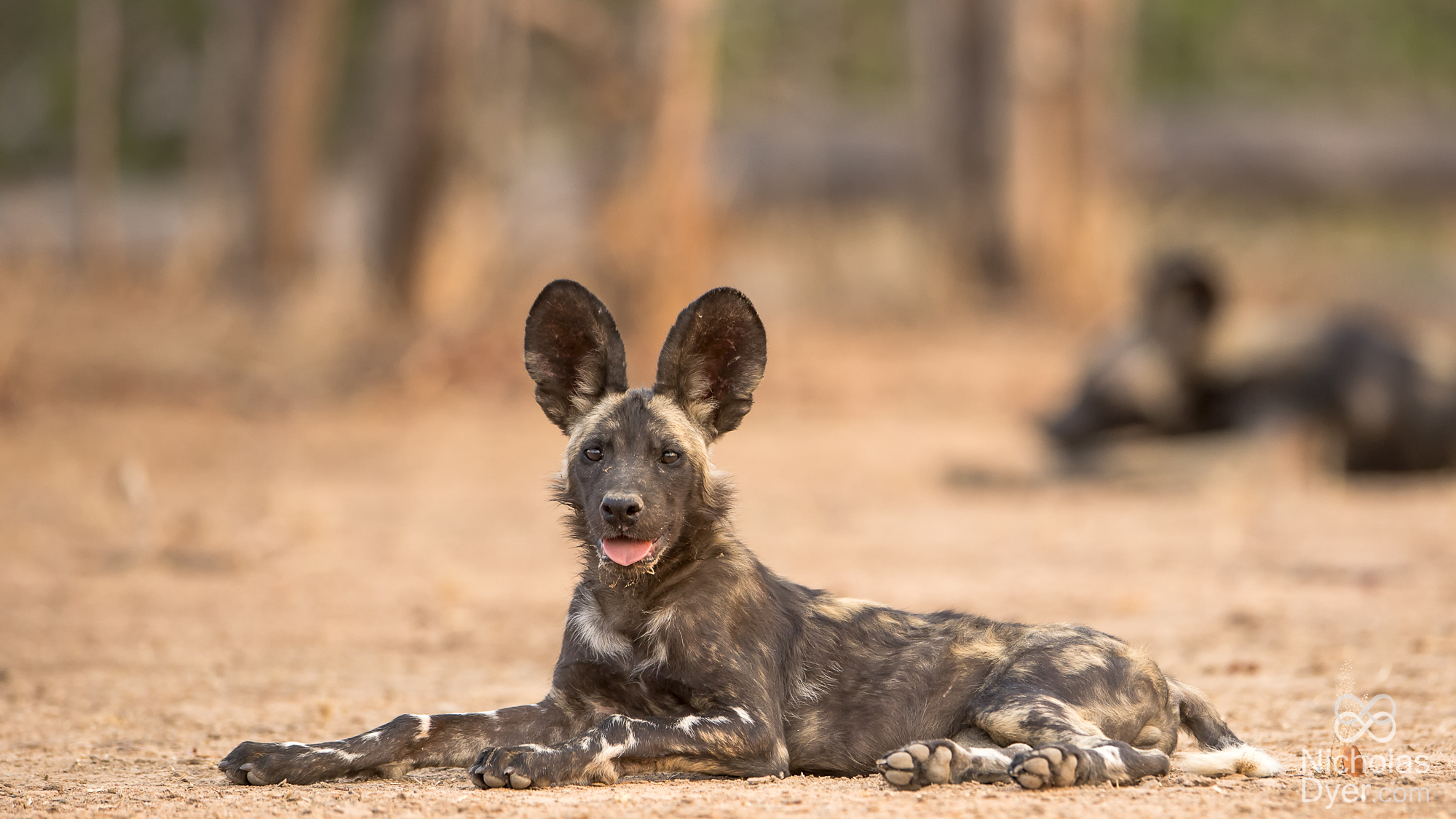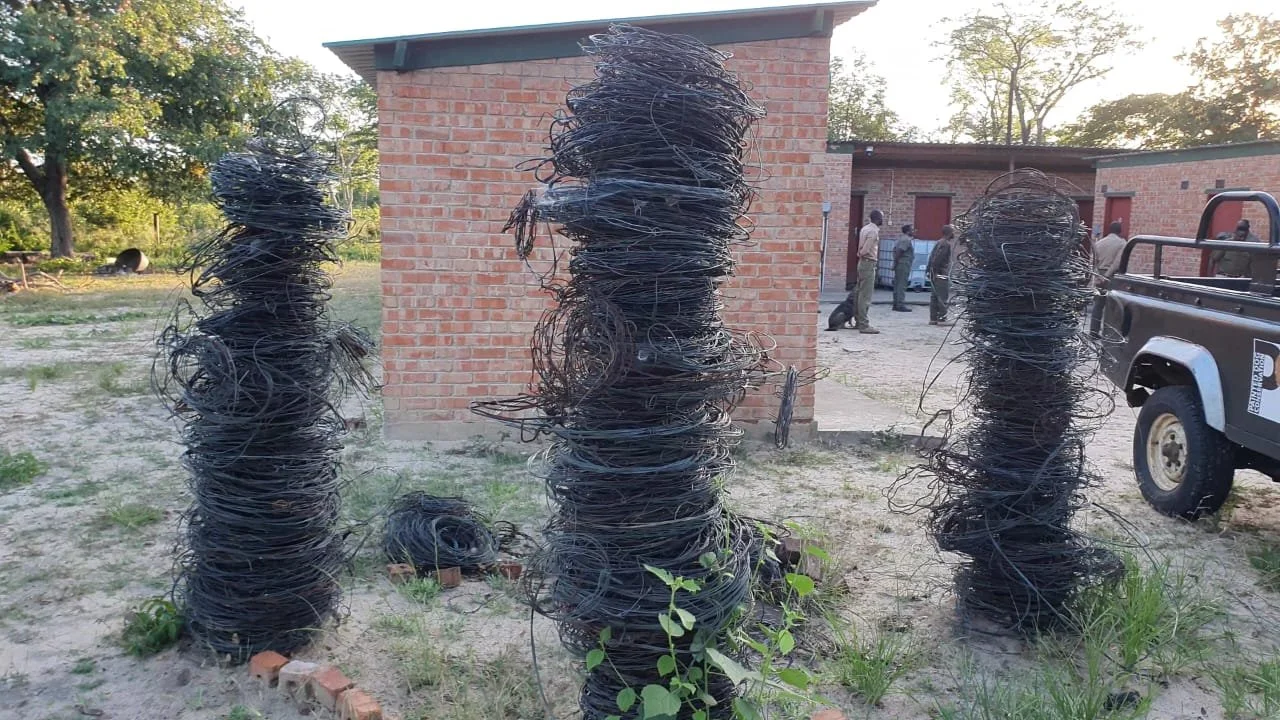
News Updates
Keeping Up with the Dogs
The dog stories for the period are a mix of both good and bad news. Most of you would know about the Mpindothela pack, a merger of the four males from the Mathathela pack which used to roam near our headquarters in Dete and the four remaining females of the notorious Mpindo pack. The pack was formed when we released the Mpindo females to join the waiting males outside our Rehabilitation facility last year.
A happy pack of painted dogs by Nicholas Dyer Photography
The dog stories for the period are a mix of both good and bad news. Most of you would know about the Mpindothela pack, a merger of the four males from the Mathathela pack which used to roam near our headquarters in Dete and the four remaining females of the notorious Mpindo pack. The pack was formed when we released the Mpindo females to join the waiting males outside our Rehabilitation facility last year.
Tragedy struck when Chenai, the seeming alpha female, was run over and Peace, one of the males, disappeared. This was quickly followed by the death of the male Khule and suddenly the pack was only five in number.
The Mpindothela pack
The pack separated soon after Khule’s death. The females Madube and Clara spent a lot of time near our Rehab facility, making frequent ‘visits’ to villages nearby to predate on goats. Despite the losses we are very delighted to report that the community responded positively. They did not kill or harm the dogs. We worked closely with the communities involved, Mabale, Dopota, Lupote and Magoli, as well as the community anti-poaching volunteers to safeguard livestock as well as keep the dogs safe.
A fellow stakeholder, Soft Foot Alliance has been piloting an earth regeneration project in a small area of Mabale and has been promoting group herding and bomas for livestock. It is interesting to note that none of the households partaking in this Soft Foot Alliance’s program lost goats to painted dogs or any livestock to any wildlife.
Community Ant-poaching Volunteers helping our Research and Anti-poaching team
In light of this and with some insights from the Tusk Symposium that we recently took part in, which emphasized working together to build resilience in conservation, we are exploring opportunities and possibilities of collaborating with Soft Foot Alliance. The aim is to expand their programs outside of Mabale village into all the villages in our core operating area. Their programs are proving to be effective in reducing human-wildlife conflict and we believe we can do more for both painted dogs and the community by working together with Soft Foot Alliance.
The Batsha pack
In Sinamatela, our base tracker Washington Moyo reported a new pack composed of two females and two males which, he named the Batsha pack, meaning ‘the new pack’. He sighted the pack for the first time in the Kashawe concession in Sinamatela. Upon investigation, he discovered that the two males are Lifa and Dela, once with the Lukodet pack and they had dispersed in 2021. The two females, Zizi and Rocco, are also dispersals from one of the well-known packs, the Bumbusi pack. A family has been formed and we are happy with this new possible breeding unit that will add to the Hwange National Park painted dog population.
The Batsha pack
Thank You Dominic, Farewell
Dominic ‘DJ’ Nyathi has left Painted Dog Conservation to pursue other interests. Many of you who visited us in Zimbabwe might have met Dominic, our Conservation and Community Liaison Manager.
Dominic ‘DJ’ Nyathi has left Painted Dog Conservation. He has been chosen by Wilderness Safaris to head up their Children In The Wilderness (CITW) programme, which is actually modelled on our Conservation Clubs that DJ established.
He served with us for 11 years and immensely contributed to our education and community programs over the years. For that, we are really grateful. While his leaving us is a loss, it’s a great opportunity for him and well deserved.
We know he will continue to represent PDC in the best possible way and we wish him all the best of luck in his new role.
Thank you Dominic!
Our Facebook Page is Back
We are glad to announce that we have finally got our old Facebook page back and we are now in control. It had been 5 months since we lost access and control to our page with over 40,000 painted dog supporters and friends.
Painted Dog Conservation verified Facebook page is back
We are glad to announce that we have finally got our verified Facebook page back and we are now in control. It had been 5 months since we lost access and control to our page with over 40,000 painted dog supporters and friends.
We would like to express our heartfelt gratitude to all of you who helped and supported us during a hard time. All those who reported the page as hacked and reported the inappropriate content that was being posted by the hackers.
We would like to also apologise for the disturbing and/or irrelevant content that was being posted in our name while the page was being controlled by the actors of the digital dark world.
Special thanks to the Tusk team for your tremendous help getting us to finally talk to a person at Facebook. And thanks to Facebook for trusting us and helping us regain access and control of our page.
So what has happened to our new Facebook Page?
We have merged the new page and old page together. All new followers of the new page are now followers of the old page. Thank you for your support throughout the difficult time.
Resolute in Protecting Painted Dogs and Wildlife
Anti-poaching is a complementary and essential effort in the holistic approach we have employed to try and save painted dogs from extinction. Our team of highly trained scouts have been in the field since 2001, removing the indiscriminate and deadly snares and arresting poachers.
Snare wire piles at Painted Dog Conservation anti-poaching base
Anti-poaching is a complementary and essential effort in the holistic approach we have employed to try and save painted dogs from extinction. Our team of highly trained scouts have been in the field since 2001, removing the indiscriminate and deadly snares and arresting poachers.
During the first quarter of 2022, our scouts conducted 262 patrols covering an area of 1422km2. They recovered 319 snares and made 2 arrests.
The community anti-poaching teams that were formed to complement PDC’s effort continue to grow as more and more people in the nearby villages display positive attitudes towards wildlife. All three Community teams comprising Mabale, Dopota and Nabushome carried out their voluntary patrols without any adverse reports. The Sianyanga community has now also indicated their intention by formalising their team and work. Sianyanga has four forest land areas around their village which need monitoring due to the frequent presence of wildlife therein and the threats by poachers to both wildlife and livestock.
This brings the total of Community APU members to 187.
A pack of painted dogs
Enock Zulu demonstrates how to use the Trimble gadget and SMART software
We trained the Mabale, Nabushome and Dopota teams to use the Trimble device and the SMART data collection software to better record their patrols and findings. The teams were issued with one device each for use during their patrols and we will undertake the same training with the Sianyanga team.
Dopota Community Anti-poaching Volunteers SMART training
Kids Back at the Iganyana Children’s Bush Camp
Our Children’s Bush Camp opened again in Mid-February. We had to ensure that all necessary recommended health protocols were put in place, to make sure the children and our staff were as safe as possible.
Songwa Primary School kids at Painted Dog Conservation
The Iganyana Children’s Bush Camp closed its first quarter and first school term on a high note after starting up late in Mid-February. We had to ensure that all necessary recommended health protocols were put in place, to make sure the children and our staff were as safe as possible.
The delay in opening schools didn’t dent the hard-working spirit of the staff at camp. St Francis A and B classes that missed camps in 2021 were the first this year although they were already in grade 7. This excited the students quite a lot as they thought they had been left out, “it’s nice to be here” they kept saying throughout their stay with us at the Bush Camp.
Kids learning at Iganyana Children’s Bush Camp
Songwa and Chezhou were the first grade 6 class of the year. Affected by lockdowns and delayed school openings we noticed the kids had an even greater challenge in reading and writing which slowed down the pace of teaching and learning at the camp. These are kids from rural areas, with no access to the internet or ways of smart learning. When everyone else was doing online lessons they were not, they were home ploughing fields and helping look after livestock. We hope, with the necessary support, we will be able to do more in-school programs and build teacher capacity programs to help bridge the gap.
Chezhou Primary School kids
Completing the generation circle?
Nelson Mandela said, “education is the most important tool we can use to change the world.” But it takes time, it’s an unending process. As if to underline this, we are now seeing students coming to the camp who are children of parents who came to camp while they were grade 6, some 16-17 years ago in what we have termed ‘completing the generation circle. We have had children shout and say, “My mother stayed in room 3 and this is the room,” this is usually met with smiles all over the face. This is an indicator that our goal of having a conservation-conscious generation in the locality is becoming a reality.
The faces of excited children are always a delight to observe and this keeps us going and wanting to do more.
Kids at Iganyana Children’s Bush Camp on a game drive




















